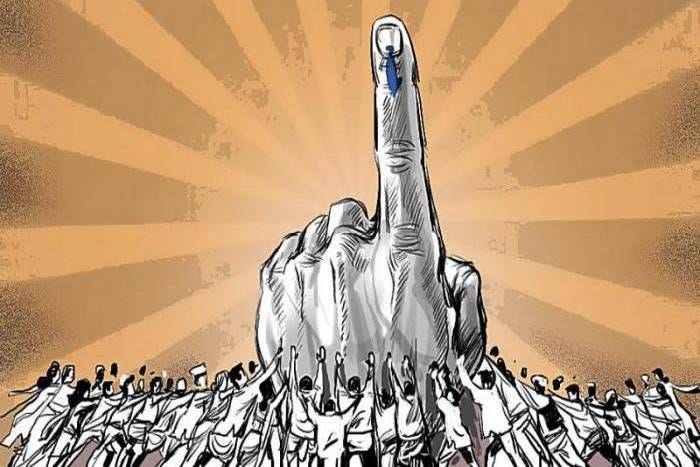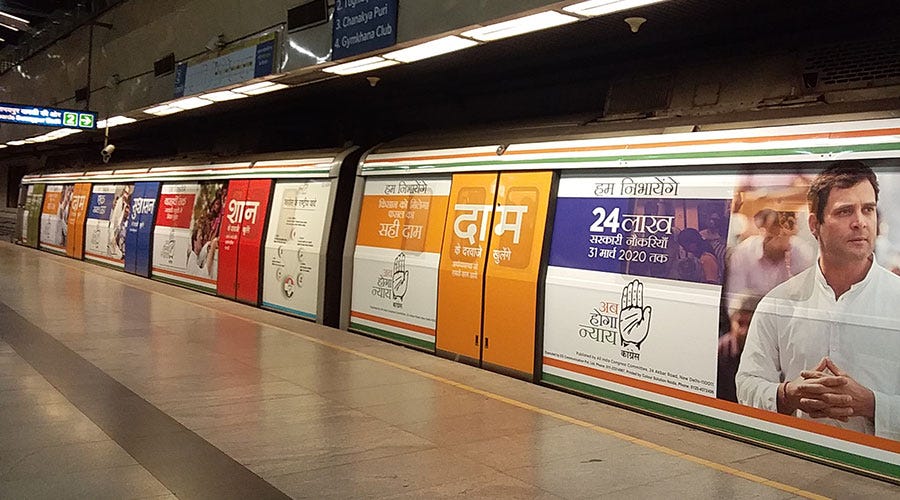By Malavika Rajkumar and Kadambari Agarwal
The Model Code of Conduct (MCC) is a set of rules and guidelines which regulate the actions of the political parties, candidates, people supporting them, the civil servants during election time and anybody else who is associated with elections. The MCC ensures that the elections are held on fair grounds, and no action is taken by the party in power which would allow it to derive any benefit therefrom during the elections or to gain an unfair advantage over other candidates/parties.


In Delhi, the MCC applies from the day the election schedule is announced, which was on the 14.02.2019, till the completion of the General Election to the Legislative Assembly of NCT of Delhi which will be on the 13.02.2019. This was notified through the announcement by the Election Commission on the 6th of January, 2020.
Do’s and Don’ts for Candidates/Political Parties
Actions against Voters
A candidate cannot bribe, threaten or induce voters to vote for or against a candidate or party. For example, a candidate cannot induce voters to vote for a certain candidate or party by saying that they will be subjected to godly punishment if they do not do it. Under Section 171B, 171C, 171E, 171F of the Indian Penal Code, 1860 (IPC), a candidate can be punished with jail time upto one year and/or a fine amount for doing any of the actions mentioned above.
Regardless of whether your candidate tells you to impersonate someone else or not, it is a crime to impersonate and vote under the law. Anyone who impersonates and votes as someone else can be punished with jail time upto one year and/or a fine under Section 171D and 171F of the IPC.
Actions against Other Candidates
Candidates cannot threaten any candidate or voter with any threat of injury, social ostracism, expulsion from any community or excommunication. Even spreading details about the private lives of other candidates and personal attacks on them are a violation of the MCC. Candidates are supposed to keep all comments limited to criticising the policies, programmes, past records and work of other candidates or political parties.
Use of Government Machinery for Campaigning
The MCC dictates that a candidate or a political party may not use any official vehicles, such as vehicles belonging to the Central and the State Government and their Public Undertakings, Cooperative Societies, etc., for electioneering or campaigning. A minister may use only his private vehicle(s) for such purposes, and the official personal staff of the minister may not accompany him. Further, no pilot car/car with beacon lights/car affixed with sirens may be used for electioneering purposes, regardless of whether the vehicle is government-owned or private.
The ruling party also cannot monopolize the use of public places like maidans, helipads, etc. while holding public meetings for campaigning; other candidates/parties should also be able to access such places equally for campaigning.


Use of Public Property for Campaigning
Candidates and political parties cannot use public property/places like railway stations, airports, bridges, government hospitals, post offices, government buildings, etc. for political advertisements for elections. They cannot write on the walls, paste any posters/papers, erect/display any cutouts, hoardings, banners, flags etc. as a part of election campaigning.


For example, very recently, the Delhi High Court upheld an Election Commission direction issued not to display any political ads on any metro rail media, including inside its premises and trains at the time the MCC is in force.
Further, if a party/candidate wants to use any individual’s land, compound wall, etc. for erecting flag staffs, suspending banners, putting up notices, writing slogans, etc., they must take prior permission from that person/owner of the property. If anyone defaces any individual’s property, they can be punished under Sections 425–427 and 431 of the IPC. Some States even have specific laws to deal with this problem, for example, West Bengal has the West Bengal Prevention of Defacement of Property Act, 1976.
Use of Religion for Campaigning
No candidate may campaign in any manner which uses religion to further the prospects of a candidate/political party during an election, or which results in the creation of tension or hatred between different castes/religious communities. For example, one may not use religious sentiments to garner votes, create disharmony between different groups of people, put pictures of politicians outside religious institutes, etc.
Political Advertisements through Media
The MCC has rules which dictate the use of political advertisements through media, like newspapers, radio, etc., for campaigning-related purposes.
- Use of Print Media
The use of print media for political advertisements is highly regulated. With respect to newspapers, the press has a duty to be objective, not spread hatred/false information, take money or other gifts in exchange for writing about a particular party/candidate, etc. Any advertisements made in newspapers, posters, pamphlets, etc. must have the name of the publisher and printer.
- Use of Television/Radio
Any advertisements/sponsored programs, etc. which support or criticize a candidate with an intention to influence the election cannot be broadcasted on the television or the radio. If general events relating to a political party are broadcasted which does not influence the public in any manner, then it can be broadcasted via TV or the radio.
- Use of Social Media
The MCC applies to all kinds of social media i.e. collaborative projects (like Wikipedia), blogs and microblogs (like Twitter), content communities (like YouTube), social networking sites (like Facebook) and virtual game worlds (like gaming applications). Certain rules regulate political advertisements on social media. For example, a party/candidate must keep a list of the expenditure incurred on social media advertisements.
Use of Armed Forces for Campaigning
There have been specific clarifications by the Election Commission, apart from the MCC, stating that Armed Forces cannot be used as political tools to further a candidate’s or political party’s campaigns for elections. Using the photographs of Chief of Army Staff or other defence personnel and photographs of functions involving defence personnel cannot be used while campaigning.
Announcement of Schemes
The ruling party, if contesting the election, may not announce new projects, concessions, etc. which may influence the voters in its favour. This applies to both ongoing and new schemes — but it does not mean that the implementation of certain schemes, like national, regional and State utility schemes, already up to the stage of completion, must be stopped/delayed. However, the commissioning of these schemes should be done by civil servants.
The Kerala High Court in Rajaji Mathew Thomas vs The Election Commission Of India mentioned that one of the functions of the MCC is to prevent the ruling party from taking unjust advantage of its position, like exclusively using the infrastructural facilities of the State or spending the discretionary funds of the State. In practice, many politicians and political parties violate the MCC, mainly because of the nature of the MCC itself. The MCC is not binding on anyone. It is a set of guidelines and rules made by the Election Commission to regulate any unfair or illegal practice by anyone involved in elections including candidates, voters, other persons involved in elections etc.
If a candidate or someone else violates the MCC rules, they cannot be punished, except in certain cases where the MCC violation is also a crime under the IPC and the Representation of the People Act, 1951. For the violation of those crimes, one might even go to jail.
As for violations of MCC alone, a warning will be issued to candidates and if the conduct continues even after the warnings, there is a possibility of being removed as a candidate. The most important role the Election Commission and election officers play during the period MCC is in force, is the immediate actions it takes in stopping violations of MCC. If you see any candidate violating the MCC rules, then through C-vigil application, you can capture proof through photos etc. and complain to the election authorities. The Do’s and Don’ts given above are only an indicative list of the MCC. Read the Compendium of Instructions on Model Code of Conduct and Application of Model Code of Conduct to understand the details given by the Election Commission.
Malavika Rajkumar is the Content Lead at Nyaaya and Kadambari Agarwal is a Research Assistant at Vidhi Centre for Legal Policy. Views are personal.


